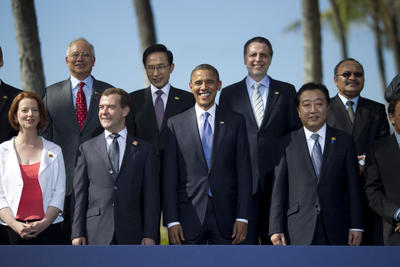Its shining light was ‘open regionalism’ based on ‘concerted unilateralism’ — members acting voluntarily and unilaterally to reduce trade and investment obstacles on a most favoured nation (MFN) basis to grant non-APEC economies the same access.
The Bogor Goals reinforced APEC, with members agreeing to voluntarily achieve ‘free and open trade and investment’ by 2010 for developed countries and 2020 for developing countries. Despite weaknesses, APEC was contributing significantly to non-discriminatory regional trade and investment. But the US — reluctant to embrace unilateralism and insisting instead on reciprocal trade deals — always favoured a discriminatory APEC FTA trade bloc that would exclude non-APEC economies from any access benefits.
And two decades on, the US is getting its way as APEC economies, including Australia, jettison the MFN principle and rush to form discriminatory FTAs. APEC is now being subtly recast into an FTA trade bloc along traditional US lines, with the proposed Free Trade Area of the Asia-Pacific (FTAAP) a prime example of this new direction. The much heralded first instalment is to be the Trans-Pacific Partnership (TPP) Agreement between the APEC economies of Australia, Brunei, Chile, Malaysia, New Zealand, Peru, Singapore, US, Vietnam, Japan and probably Canada and Mexico.
Australia should oppose the TPP and FTAAP for the same reasons it initially rejected APEC preferentialism. While the TPP and FTAAP may suit the US’ political and trade agendas, they are not in the economic interests of the region, APEC or Australia.
First, implementing the TPP and FTAAP would be a retreat to discrimination. The FTA label is deceptive — FTAs are really ‘Preferential Trade Agreements’ and have little to do with free trade.
Second, Australia and the APEC region already have a growing ‘noodle bowl’ of overlapping FTAs, and the TPP would simply compound this mess. For example, it would be Australia’s third FTA involving Singapore.
Third, it would further demean the non-discriminatory Bogor Goals, already fudged to support discrimination. The Australian government’s April 2011 Trade Policy Statement misleadingly claims that ‘Longer term, Australia and other APEC members aspire to the formation of a Free Trade Area of the Asia-Pacific … spanning all APEC economies’, and that the FTAAP is ‘a logical extension of APEC’s Bogor Goals but there are no prescribed paths for achieving it’. It further notes that the TPP is ‘one possible pathway’.
But the FTAAP is not a ‘logical extension of APEC’s Bogor Goals’; it is hard to see how forming a discriminatory APEC trade bloc will serve these non-discriminatory goals. Moreover, the Australian government’s claim ignores the advice of its independent advisor, the Productivity Commission, that Australia ‘should give weight, in prioritising and negotiating agreements, to non-preferential arrangements such as APEC, and to non-preferential provisions within other agreements’.
If the Australian government believes the TPP and FTAAP will benefit Australians, it should be honest and transparent in explaining why. FTAs are sold as comprehensive, groundbreaking and liberalising, but always fall well short of such ideals; FTAs are about politics and foreign policy. Despite the government’s sales pitch, the Productivity Commission highlighted that the economic outcomes of Australia’s FTAs have been oversold and disappointing.
This confirms World Bank research arguing that FTAs have failed to deliver the promised economic liberalisation needed to produce substantial economic benefits — especially in services requiring domestic ‘behind-the-border’ regulatory reforms that can only be tackled unilaterally. The Australian government should not sell the TPP, FTAAP and FTAs more generally by hiding behind unsupportable and exaggerated economic claims which fail to appreciate that the main economic benefits of trade reform result from self-liberalisation rather than gaining market access abroad.
Just how pursuing the TPP and FTAAP could ever be reconciled with the government’s five praiseworthy guiding principles — unilateralism, non-discrimination, separation of trade and foreign policy, transparency, and indivisibility of trade policy and economic reform — and how Australia aims to apply them, is a mystery.
If the government wants to return to the days when the main game was unilateral reform as signalled in its Trade Policy Statement, it should again embrace non-discrimination and fight against a discriminatory APEC. FTAs weaken the multilateral trading system and crowd out domestic efforts to adopt MFN-based unilateral trade reforms. They take focus away from what really matters — a strong domestic commitment to unilateralism supported by a well-functioning and liberalising WTO. Governments are hypocritical and counterproductive in preaching the virtues of unilateralism and the WTO while negotiating FTAs.
The Government-commissioned Ken Henry White Paper on Australia in the Asian Century provides an opportunity to rectify the government’s confused trade policy by putting Australian and regional efforts back on the path of unilateralism. Oddly, the Trade Minister’s paper released on the proposed White Paper compounds the confusion by asserting, quite contrary to what was agreed later in the TPP/FTAAP talks in Hawaii, that the ‘Gillard government’s commitment to free trade extends to negotiating bilateral and regional agreements on a non-discriminatory basis’. If the Henry White Paper is to achieve anything it will need to to bring a halt to that kind of hypocrisy.
Malcolm Bosworth and Greg Cutbush are Visiting Economists at ANU Enterprise.
An earlier version of this article was first published here in the Australian Financial Review.

